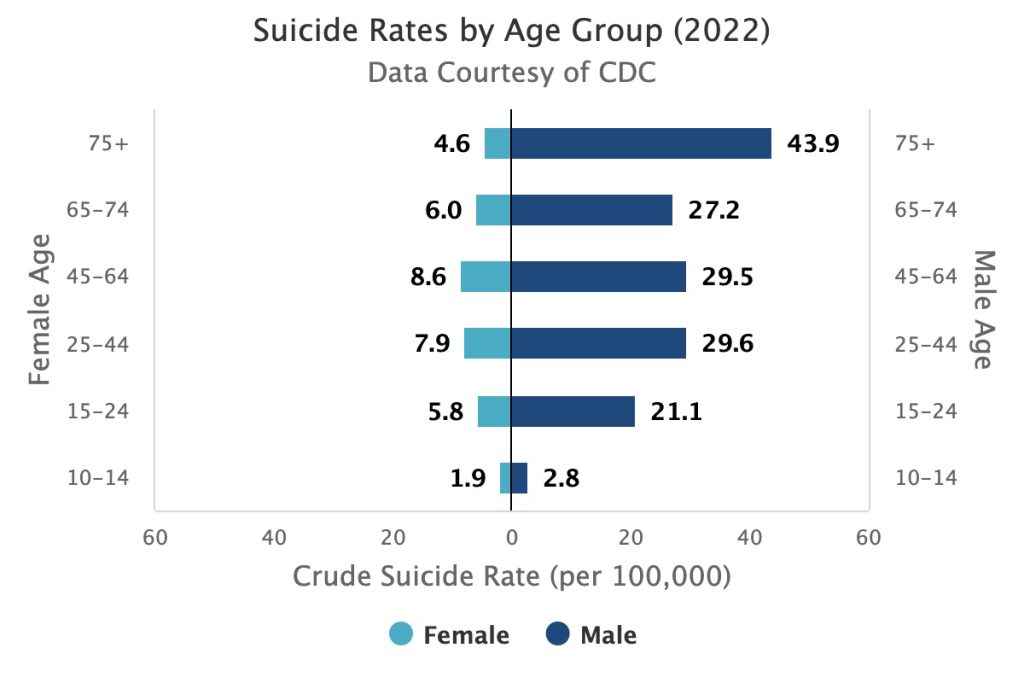By Ava Washington
Note: The following story discusses suicide.
When Jase Chamblee was 4 years old, his parents filed for divorce. The divorce was difficult for him because he would see all the other kids with their parents and siblings, planning family trips and doing things together as a family—but Chamblee didn’t have that.
He did have one older sister and two older brothers. At the time of the divorce, they were in high school, so he felt he wasn’t really able to talk to them about his feelings.
“We were all kind of affected by the divorce, but the age gap between me and my siblings is so great that they were in high school and going to college by the time that they divorced, and I was still very adolescent,” Chamblee says. “So I feel like things such as how to communicate with people weren’t really taught to me.”
After the divorce, he lived with his mom who was a teacher, so she was often exhausted, and they never really talked. His father, whom he saw only on holidays, was more of a traditional man. He taught Chamblee how to work on cars and fix things up around the house, but he never addressed the emotional aspects of dealing with emotions and expressing himself.
Chamblee wasn’t in touch with his emotional health until he went to college. The pressure of all his different classes and having to pay tuition really took a toll on his mental well-being, but he never said much about it. When simple things became difficult for him, the college student became more concerned.
“I didn’t have the energy to do anything anymore,” Chamblee says. “Things like laundry, keeping stuff organized, personal hygiene. Some mornings I forgot to brush my teeth and then (didn’t) even realize it until late at night.”
Chamblee’s experience isn’t uncommon. Men’s mental health has become a rising area of focus in public-health conversations, yet many issues regarding a man’s mental well-being are still overlooked. Although both men and women face mental-health challenges, men have a suicide rate four times higher than women despite being diagnosed with mental-health disorders at lower rates. Research shows that men are less likely than women to seek help or receive treatment for mental illness, due to factors such as the way a young man was raised, societal expectations, cultural backgrounds and gender roles.
‘Men Don’t Cry’
In high school, there were times when Chamblee tried to talk to his parents about his emotions, but they would always say, “Oh, you’re just going through puberty,” “You’re not old enough to understand what you’re feeling” or “It’ll get better as you get older,” he says.
Research shows that most boys are taught at a young age to be strong and not be emotional because many people believe “men don’t cry.” Family dynamics have a huge impact on the development of a young boy’s mind, how they navigate their emotions as they get older and the way they express themselves.
University of California, Berkeley, psychology professors James J. Gross and Robert W. Levenson warn that discouraging men to be emotional or express themselves can lead to a phenomenon called “emotional suppression,” where individuals learn to hide their emotions, rather than confronting and dealing with them in a healthy way.

“I hate expressing my feelings; it’s difficult for me,” music teacher Xavier Edwards explains.
“As a child, I wasn’t fostered to share everything I wanted to or articulate my feelings the way I needed to.”
Edwards tells the Youth Media Project that he was raised in a household where he wasn’t able to express himself properly, so as an adult, it’s been harder for him to open up to people. He says listening to music or going skating is easier for him when he’s going through something.
Expressing Himself to a Bottle
Youth Villages mental-health therapist Kirsten Henry says it is important to create a safe space for young boys to express themselves. When they’re older, it’s harder to absorb certain truths because they were taught at a young age what isn’t acceptable as a man.
“You know, I’ve seen things growing up, like, ‘men can’t cry,’ ‘boys can’t cry,’ ‘stop that crying, you’re a boy, you’re not supposed to cry,’” Henry says. “So it just goes back to social norms and societal expectations of men being strong.” She says the way society thinks a man should act prevents them from opening up.
Research has shown that toxic masculinity makes men more vulnerable to peer pressure, meaning they don’t want to appear weak in front of their peers. When dealing with mental issues, a man is more likely to exhibit negative behaviors, such as anger, frustration and irritability, which could all be signs of substance abuse.

Men are twice as likely as women to develop alcohol use disorder, the National Institute of Medicine reports. The same study found that men have a higher tolerance for substances than women, and this can often lead to overconsumption because more of the substance is required to give a temporary sense of relief. Resorting to these methods is why some men display aggressive behaviors because substance abuse begins to affect the brain and other areas of the body, causing mental and physical illness, experts say.
“You don’t have to talk to a bottle of liquor or express yourself to a bottle of pills. You don’t have to tell that substance your problems or why you’re suffering, so most men feel like abusing substances alleviates the pain,” Henry says.
‘The Man Is the Provider, Right?’

Cultural backgrounds play a major role in how different minorities—specifically people of color—handle mental illness.
“I’ll say the number-one thing that causes mental problems in Black men is jobs, because the man is the provider, right?” Institute for the Advancement of Minority Health men’s health program manager Markyel Pittman says.
It’s already harder for Black men to find a good job and provide for their families, especially in rural areas. “The average Black man only makes $30,000 to $40,000 a year in Mississippi,” Pittman tells the Youth Media Project. “If that Black man isn’t married and he has kids, that’s child support and tax already coming out of your check before you even touch it. So most Black men don’t go to therapy, because most of the time they can’t even afford it.”
Pittman says not only do Black men neglect getting mental health care, but adds that most men don’t even get physical check-ups anymore because if a person is living in a rural area, it could require a two-hour drive to see a doctor. Also, if they do go, they’re most likely to receive inadequate care because there is little anonymity, social stigma and privacy concerns that act as barriers to health-care access.
Living in rural areas also puts Black men at a disadvantage because there aren’t as many resources or places to get help. The Rural Health Information Hub reports that U.S. residents who live in rural areas experience higher rates of suicide and depression than people who live in urban areas—but have less access to mental health care.
‘Is There Something Wrong With You?’
The gender expectations society puts out can really make a man question what’s actually genuine and what’s not. Some Black men say that stereotypes such as women being emotional and the “prize” in a relationship and the man needing to be the provider contribute to negative cycles.
“I like to relax, and I also like to be soft around people,” Xavier Edwards says. “But the moment that I choose to be soft, people ask me if I’m gay, if I’m bisexual. People ask me, ‘Is there something wrong with you?’ There’s always some question or some prompt towards how a man wants to react. And so it’s like if I’m not as masculine in that moment, how do you see me?”
Such gender norms can severely take a toll on a man’s mental health. In addition to gender expectations, men in a traditional household are often expected to have a stable job that supports the whole family because society often relates the man of the household to being the “breadwinner.” Studies have shown that if a man cannot live up to those expectations and does not have a good-paying occupation or loses his job, it often leads to low self-esteem, anxiety and depression.
Although unemployment can affect anyone, its effects on men can be more severe. Because society expects them to be the protectors and providers, men can sometimes feel worthless when they’re unemployed. Research shows that unemployed men demonstrate severe symptoms of depression and anxiety.
Depression affects nearly 6 million men in the U.S., WPS Health reports, but experts believe that number is actually higher due to men feeling the need to be strong and keep everything to themselves.

Having an open mind and going to therapy can be effective. A 2016 survey of Heads Up Guys found that after going to therapy, 74 percent of men felt they could better recognize symptoms of depression; 64 percent reported feeling less alone in their experience of suicidal thoughts; and 72 percent indicated an increased sense of hope for recovery.
“Mental health is a real illness, although a lot of people might not think so, you have to get your mind right before anything,” mental-health therapist Kirsten says. “As a society I think we should try to be more educated on our mental wellbeing.”

